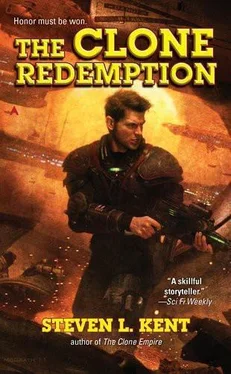Steven Kent - The Clone Redemption
Здесь есть возможность читать онлайн «Steven Kent - The Clone Redemption» весь текст электронной книги совершенно бесплатно (целиком полную версию без сокращений). В некоторых случаях можно слушать аудио, скачать через торрент в формате fb2 и присутствует краткое содержание. Жанр: Боевая фантастика, на английском языке. Описание произведения, (предисловие) а так же отзывы посетителей доступны на портале библиотеки ЛибКат.
- Название:The Clone Redemption
- Автор:
- Жанр:
- Год:неизвестен
- ISBN:нет данных
- Рейтинг книги:4 / 5. Голосов: 1
-
Избранное:Добавить в избранное
- Отзывы:
-
Ваша оценка:
- 80
- 1
- 2
- 3
- 4
- 5
The Clone Redemption: краткое содержание, описание и аннотация
Предлагаем к чтению аннотацию, описание, краткое содержание или предисловие (зависит от того, что написал сам автор книги «The Clone Redemption»). Если вы не нашли необходимую информацию о книге — напишите в комментариях, мы постараемся отыскать её.
The Clone Redemption — читать онлайн бесплатно полную книгу (весь текст) целиком
Ниже представлен текст книги, разбитый по страницам. Система сохранения места последней прочитанной страницы, позволяет с удобством читать онлайн бесплатно книгу «The Clone Redemption», без необходимости каждый раз заново искать на чём Вы остановились. Поставьте закладку, и сможете в любой момент перейти на страницу, на которой закончили чтение.
Интервал:
Закладка:
He walked straight to the far wall and examined the gaping hole that looked like a mural of open space. If I’d thrown a grenade, the percussion might have knocked the bastard through the gap, and he could have floated to the next galaxy for all I cared. I couldn’t risk it, though. I waited a second, then dashed toward the hatch.
This time his fléchettes barely missed me. I saw holes appear on the wall ahead of me and laughed. He was toying with me. He thought he was a cat playing with a mouse, but he was mistaken. Sure, he had the protective armor, and that made him confident, but I controlled this fight. Unless he got very lucky, his time in the U.A. Marines was about to end.
“Any luck finding your computer?” I asked as I sprinted down the hall.
“Yes,” Freeman said. “These guys were at Olympus Kri.” Olympus Kri was another planet that the Avatari had burned.
“Sounds like they had a disaster fetish,” I said.
“You safe?” asked Freeman.
“I have an angry Unified Authority Marine in shielded combat armor chasing me down a dead end,” I said.
Freeman did not say anything. He knew the situation.
I said, “I’ve got things under control.”
The next landing bay was almost right across the hall. I ran to the hatch, but it did not open. As I pushed off and started for the last landing bay, a trio of fléchette holes appeared in the wall near my head. The bastard’s aim kept improving.
I streaked down the hall in a balls-out race. Cocky or not, this guy would win the fight if the next hatch did not open. Hell, he might get lucky even if it did.
I hurled myself at the hatch, and the door slid open. Bolting through as fast as I could, I tripped over a dead sailor, barely managed to catch my feet, and ran toward the transport that sat with its hatch open. I jumped over the frozen corpse of a dead tech lying on the ramp, entered the kettle, and hit the button to close the doors at the rear of the ship. Then I climbed the ladder that led to the cockpit three rungs at a time.
As I reached the top, I looked back over my shoulder. I could not see the doors at the bottom of the ramp, but I knew how slowly they moved. They were eighteen inches thick and made of metal. It would take them twenty seconds to close.
The man in the armor made it through the doors and up the ramp. I could not see him, but I saw the glow that his shields cast on the wall as he strolled up the ramp. He moved slowly, casually, probably keeping a wary eye for more grenades.
I slipped from the ladder to the catwalk that led to the cockpit. Then I knelt low against the metal walkway and watched the bastard as he reached the top of the ramp.
“I have the computer,” Freeman said over the interLink.
Hidden and protected by a thick steel wall of transport construction, I lay on my back and laughed.
Freeman must have mistaken my laughter for combat strain. He asked, “Harris, where are you?”
“I’m fine,” I said.
“What is the situation?” Freeman asked.
“I’m in a transport in the third landing bay.”
“Where is the Marine?”
“You call this shithead a Marine?” I asked, still laughing. “I’ll tell you what—the Unifieds are scraping the bottom of the barrel. The only thing this guy’s trained for is KP duty or maybe scrubbing the head.” As I said this, the doors at the back of the transport clanged shut. I was trapped in the transport with an enemy wearing shielded armor, and I could not have been happier about it.
“Harris, hang on. I’m on my way.”
“Take your time, Ray,” I said. “There’s no rush.”
The U.A. Marine knew enough about his armor to switch to heat vision. He either used heat vision or possibly radar. One way or another, he spotted me on the catwalk and fired. His fléchettes hit the iron walls and dropped to the floor. This bird was made to withstand missiles and particle beams, depleted uranium fléchettes could barely scratch it.
Tracking the guy with my heat vision, I sat with my S9 pistol ready and watched as the poor bastard wasted his endless supply of fléchettes. I laughed. “You can’t hit me, asshole. Not from down there,” I yelled. He didn’t hear me. I was talking to myself.
Down on the deck, the guy kept firing fléchettes in my direction. I switched from interLink to external speaker on the off chance he might be listening. I yelled, “Hey, shit for brains, you’re wasting ammunition.”
In response, the bastard shot five more fléchettes, then yelled, “Get specked.” The term, “speck,” was sometimes used as a noun referring to bodily fluids and sometimes used as a verb referring to the transmission of those fluids. On the hierarchy of modern profanities, “speck” was as bad as a word could get.
“Have it your way,” I called back. “You’ve been chasing me for about ten minutes now. That leaves you with about half an hour before the battery powering your shields runs out.”
He answered with a flurry of needles. Some struck the ledge below me, some flew over the catwalk. Nothing came close to hitting me.
When he came to his senses, the bastard would realize that he had two choices—he could climb the ladder to come after me, or he could open the rear hatch and escape. Either way, he would need to lower his shields. The shields would prevent him from wrapping his hands around the ladder, and they would short out the circuits if he tried to work the hatch.
Using heat-vision lenses, I watched as he worked out his options. Hoping to keep me honest, he fired sporadic fusillades of fléchettes in my direction. After a minute or two, he started toward the ladder. The bastard must have known that his shields would repulse anything he touched, but he had to make sure.
I moved toward the edge of the catwalk on the off chance he was stupid enough to lower the shields and start climbing. He stood at the base of the ladder and weighed his options, growling like a caged animal and firing fléchettes into the impenetrable steel of the kettle walls.
Apparently rejecting the ladder as an option, he paced back and forth across the floor of the cargo hold. I could not see him, per se, just the red-orange oval of his heat signature. He walked toward one corner of the cabin, maybe looking for a better shot at me, then he stormed off in the other direction.
By this time, he had figured out an indisputable truth—he could not exit the transport without opening the rear hatch. There were only two mechanisms for opening that hatch. One was up in the cockpit, one was in the kettle. He walked to the panel at the far end of the kettle.
At that point, I needed to do more than track heat signatures—I needed to watch the bastard. Needing to catch him the moment he lowered his shields, I crawled to the edge of the catwalk and stared down at him.
He stood a foot from the panel with his back to me, staring at the button. He stayed that way for several seconds, then spun and fired six shots my way. His shots were wild. Most of them struck the wall somewhere below me and ricocheted around the kettle.
Now we were both in trouble. He could not hit that button without lowering his shields; but I could not watch him without placing myself in his line of fire. Realizing my trap was not as bulletproof as I had surmised, I ducked back behind the ledge and used my heat-vision lenses to watch as his hand edged toward the button. He fired a couple of shots at me, reached for the button, and stopped. I could not tell if he was waiting to shoot me or looking at the button. When I rose to my knees, he fired. Suddenly, the bastard knew how to aim; his first shot missed me by an inch.
I dropped to my stomach. When I raised myself with my elbows, he fired again. In the brief glimpse I got, I saw him there, standing two feet from the button, his right arm pointing up toward me and his left probing toward the button. Like him, I was using heat-vision tracking. I switched to tactical view, the unenhanced view we used on the battlefield.
Читать дальшеИнтервал:
Закладка:
Похожие книги на «The Clone Redemption»
Представляем Вашему вниманию похожие книги на «The Clone Redemption» списком для выбора. Мы отобрали схожую по названию и смыслу литературу в надежде предоставить читателям больше вариантов отыскать новые, интересные, ещё непрочитанные произведения.
Обсуждение, отзывы о книге «The Clone Redemption» и просто собственные мнения читателей. Оставьте ваши комментарии, напишите, что Вы думаете о произведении, его смысле или главных героях. Укажите что конкретно понравилось, а что нет, и почему Вы так считаете.












